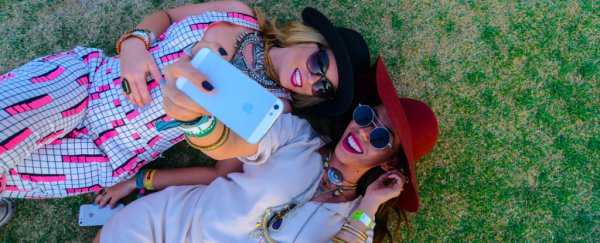If you're a fan of filling up your Instagram and Snapchat feeds with selfies, you might want to reconsider - a new study suggests that you're probably not as beautiful as you think you are, and plastering your face all over the internet isn't giving the world the best impression.
Yup, in a new shade-throwing study, researchers say that independent observers typically view rampant selfie-takers as more narcissistic, less attractive and less likeable compared to individuals who forgo the solo photos.
In the study, which was conducted by researchers from the University of Toronto, scientists gathered 198 college students. One hundred of these students were selfie-takers, while the other 98 reported little to no selfie-snapping.
These students were asked to take a selfie fit for social media, and were then also photographed by one of the team members, resulting in each participant having a selfie and a standard picture of themselves.
With these pictures in hand, the students rated how attractive they thought other people would find them. The team then had a group of 178 independent, outside observers rate the photos for attractiveness, likability and narcissism.
When all was said and done, both groups - the selfie-takers and non-selfie-takers - reported themselves more attractive than they were rated by the outside group, though the selfie-takers were off by a greater degree, reports David Hayward for PsyPost.
Also, all of the researcher-taken photos were rated higher than the selfie photos. Plus, the selfie-takers were rated significantly higher on the narcissism scale.
The study had a pretty limited sample size, so more work needs to be done to verify and confirm the results. But basically the research is suggesting that not only do people think they are way hotter than they actually are, but taking selfies also significantly decrease people's opinions of you.
"Selfie-takers generally over perceived the positive attributes purveyed by their selfies," the team said in a report by Adam Boult for The Telegraph. "Here, we found that selfie-takers believed their selfies to look more attractive and likeable than photos of them taken by other people."
So, if taking selfies is perceived so poorly, why the heck do so many people do? It comes down a well-known psychological phenomenon called 'self-favouring bias', which states that "people have a tendency to perceive themselves as being better than average on a wide range of positive traits", reports Hayward.
Basically, people think they're better than others. This isn't news, but those feelings are greatly increased when people have more control.
For selfies, people pretty much have the most control possible because they can adjust the angle of the shot, the filter, when they post them to social media and every other aspect. The study suggests that this causes people to have a rather extreme bout with self-favouring bias.
This isn't the first study to ponder the negative side of the selfie craze, either. Last year, researchers from Ohio State University said that male selfie-lovers show signs of psychopathy. And based on media reports, selfie-taking killed more people last year than sharks.
All of these studies are basically saying that maybe it's time to cool it with the selfies. After all, if you're friends with someone on Instagram, they probably know what your face looks like, no need to remind them hundreds of times a day.
The new study was published in Social Psychological and Personality Science.
